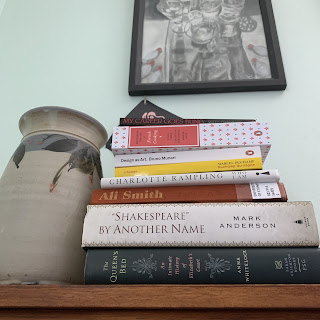On reading Ali Smith’s Autumn (2016) I
In preparation for a masterclass led by Deidre Lynch on Ali Smith's Seasons quartet next month at the University of Sydney. This is a first response to the text with a gesture towards fidelity to quotations prompted by my research into commonplace books and the use of prior text.
Dear Void,
'It was the worst of times, it was the worst of times. Again. That’s the thing about things. They fall apart, always have, always will, it’s in their nature'.
On the surface of it, the first four sentences of Autumn by Ali Smith appear to make a clumsy leap from the use of literary quotation to a dim notion about the nature of things, that things fall apart naturally. But the sentence is a deft offer of the way literary quotation falls apart. The iterative use of phrases and quotes change them and break them apart by way of reuse, rearranging and levering. The integrity of literary quotes is lost as their component parts get prised from their contexts or cleaved from the other parts of the sentence form.
The first dozen words of A Tale of Two Cities (Dickens’ historical novel first published in 1859) is such an example.
'It was the best of times, it was the worst of times'. Full stop.
It has come to be received as a chorus made of two short parallels. But what is often repeated, almost parroted, is not the whole quote. 'It was the best of times, it was the worst of times' doesn't end with a full stop, as is often suggested in its reuse. There's a comma after 'the worst of times,' and the sentence carries on. In fact, it's quite a long sentence:
'It was the best of times, it was the worst of times, it was the age of wisdom, it was the age of foolishness, it was the epoch of belief, it was the epoch of incredulity, it was the season of Light, it was the season of Darkness, it was the spring of hope, it was the winter of despair, we had everything before us, we had nothing before us, we were all going direct to Heaven, we were all going direct the other way--in short, the period was so far like the present period that some of its noisiest authorities insisted on its being received, for good or for evil, in the superlative degree of comparison only'.
Far from being a short rhetorical repetition, (best times/worst times) Dickens' sentence spreads out in a vascular system of connected words. It branches off from the overarching idea of past time or memory time, extending to age, to epoch, then to season, and to a pair of descriptors that feel like they're binary terms but in fact the first, spring, is a climate condition that follows, even blossoms out from the second, winter. By extension (for Dickens' purpose) hope (spring's hope) would follow despair (winter's despair). This of course relies on a conceptual understanding of spring as equating with hope and winter with despair and not as, as many of us understand winter to be, a wonderland. But the sentence doesn't stop there. There was everything and nothing, heaven and hell. Perceptions of how the times were experienced or how they were to be remembered were comparative and determined by 'its noisiest authorities’.
‘It was the worst of times, it was the worst of times’. Full stop.
Smith takes up Dickens' 'selvaged' quote offering a new distortion which suggests no return to a swing from one state to another or the possibility of coming back around to spring and to hope. Dickens’ quote is stuck in a loop from 'worst of times' to 'worst of times' and has fallen apart, as things do. Though, repair is possible I say, made by returning to the whole quote. By learning to repeat, perhaps to recite, certainly reread more than the selvages of text would go some way to repairing the distortions made to text and of literary text in particular. The thing about text is that, by nature, it is relatively durable and will still be waiting there in the pages of a book, as faithful to an original as possible and ready to defend against those noisy ‘authorities’.
Jx
PS. I’m enjoying Autumn and have, in fact, got further than the first four sentences.



Comments
Post a Comment